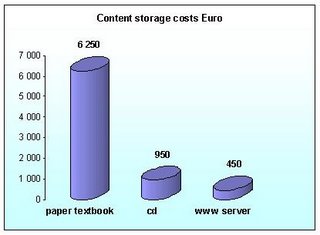Individual publishingE-learning content, similarly to traditional books is one of the most important part of the whole product and have the highest influence to project/course success. Contrary to paper books, where only text and pictures (or images) are required in e-learning curses there is much more elements. I present below short list of most popular of them. (according to
YDP)
All those elements require a lot of work to be prepared however, may be cataloged and re-used to many different courses.
Collaborative publishing
Wiki software (as part of Web 2.0) makes it possible to publish a website with very little technical knowledge but puts a greater emphasis on collaborative rather than personal publishing. Wiki technology may significantly increase the speed and spread of information and knowledge potential e-learning page may contain. Lets look at wikipedia that is in my opinion - just perfect!
Similar to Wikipedia - elearning courses my rise in enormous speed and size. Critics says that wiki-based-product because of the lack of "central editors" may have not good enough quality and accuracy of any entry. I do not see any problems with knowledge quality and totally agree with wiki community that points out that if a user spots a mistake, they are free to correct it for themselves, and that any vandalism is usually eradicated within five minutes.
However, I see the problem with knowledge-verification process. If each e-learning page is free and open and is used to learn and verify the learners knowledge - a special pages with test result will appear. However, that is because there is no question that could not be answered by "internet"!
Evolution of Web 2.0 may rise the problem of necessity of existing of editors and publishers. Will authors (or group of authors, or internet society) will need anybody that will take care of publishing their thoughts, books, courses? Even today they don't need anybody. Publishing becomes very easy. So what publishing houses will do in 5-10 years form now?
Links








